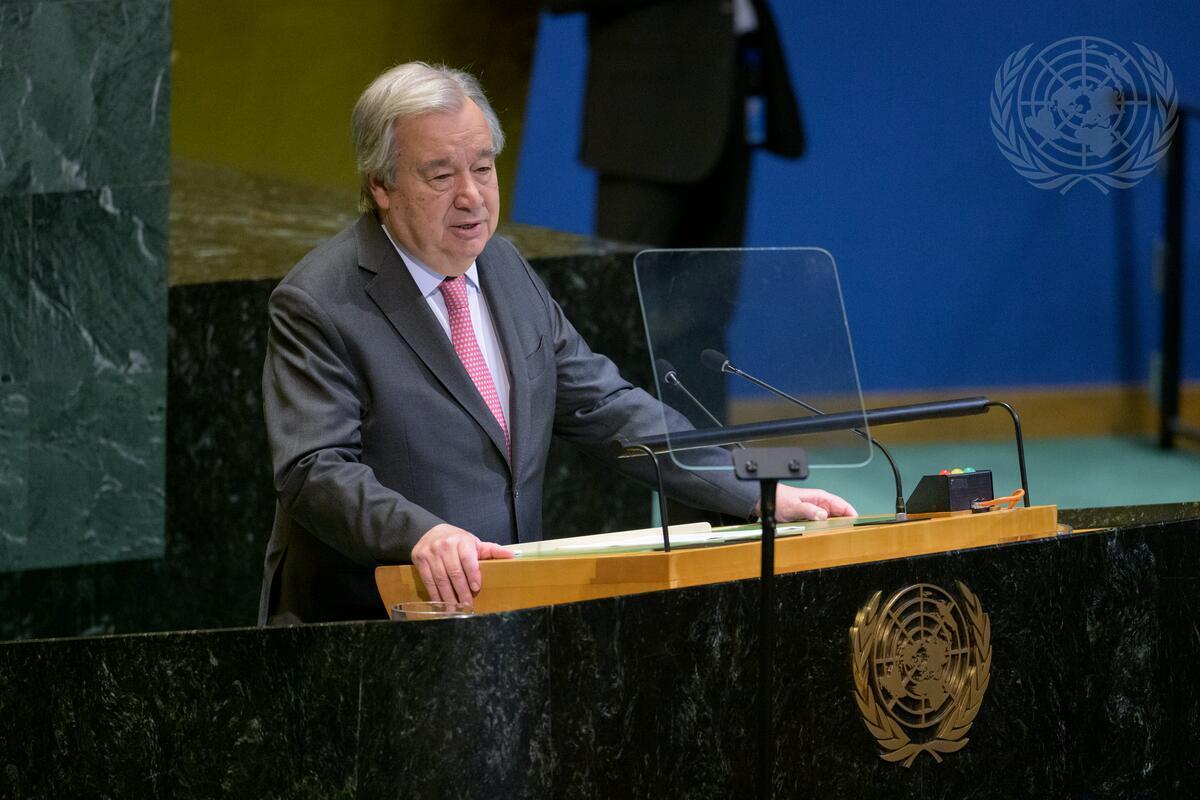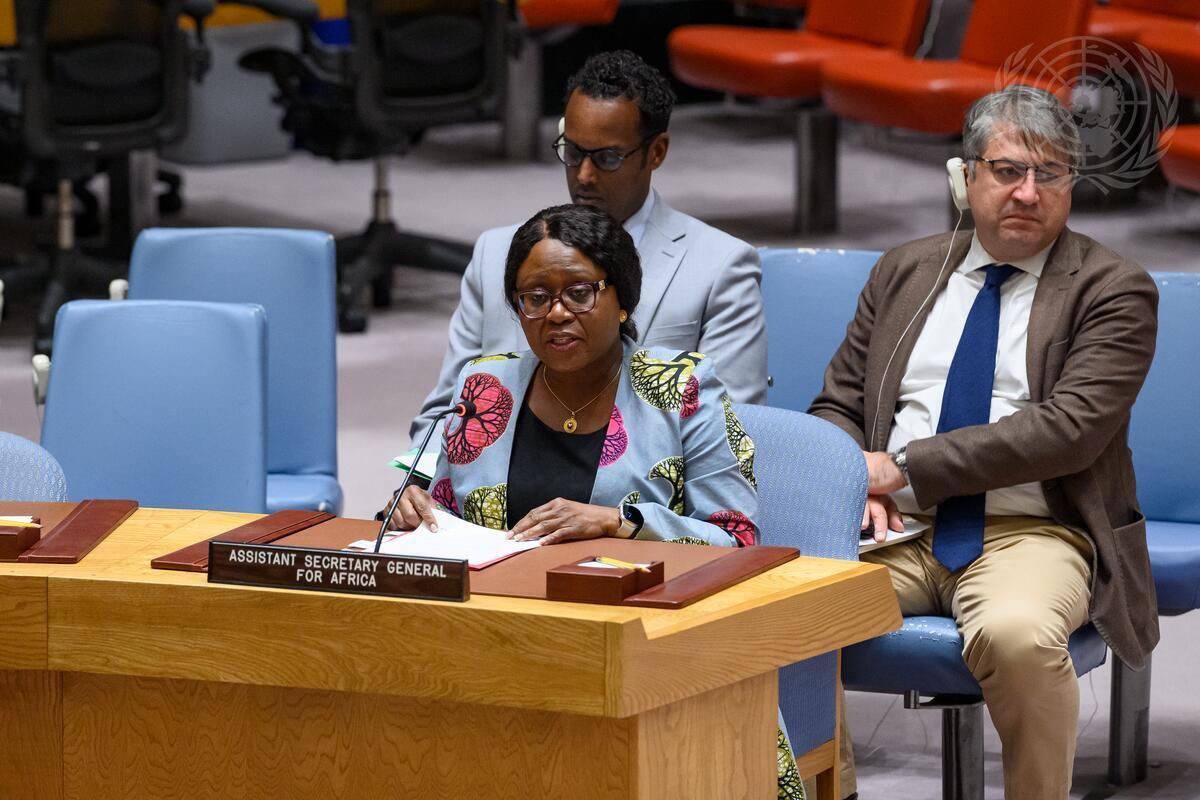Thank you, Madam President, Members of the Security Council,
Let me thank you for the opportunity to speak with you today. You may recall that last time I briefed this Council, I told you that we may have some good news when I come back in December.
And for over a year now, positive news has been in short supply in Sudan. Since the military takeover of 25 October 2021, the country has found itself in a multidimensional - political, economic and security crisis. The dynamics of the past couple of weeks, however, inspire hope that Sudan may find a way out of the crisis and embark on a more sustainable new transitional phase.
Let me explain these dynamics.
Last Monday, 5 December, the military leadership and a broad range of civilian actors signed up to a political framework agreement. It is supposed to lay the ground, after a further round of talks on substance, for a final political accord and the formation of a new civilian government leading the country towards recovery, democratic elections - and this over a two-year transition phase.
Let me commend the efforts by all Sudanese sides. Military and civilian stakeholders have come a long way; from the coup one year ago, the military’s announcement last July to withdraw from politics, to these latest developments.
On 24 October, the Trilateral Mechanism, i.e., the African Union, IGAD, and UNITAMS, received a document from the military leadership with their comments and amendments to the draft constitutional document which had earlier been prepared under the auspices of the Sudanese Bar Association’s Steering Committee. This represented a significant first breakthrough. Concurrently, civilian signatories to the draft have formed a coalition to engage collectively in talks with the military. This coalition and the military then agreed on a two-phase political process to return to civilian-led transition.
And the first phase has now been concluded with the signing of the political framework agreement. The second phase is about to begin. And the events of the last two days are actually the reason for me not being in New York today but talking to you from Khartoum. Encouragingly, both civilian and military stakeholders have become more transparent about preliminary understandings and have increased their efforts to reach out to other actors and to the public. A final political agreement, once reached, will lead to a civilian government that should be in a better position to address the security, humanitarian and economic situation, should pave the way towards building a democratic state based on human rights, rule of law and gender equality, and provide a future for the young men and women of Sudan. It will also allow for resumption of peace talks with movements that that have yet to make peace with the government, and for the restoration of broad-based international support to Sudan.
As we are approaching the end of this year, it’s an opportune moment to reflect on the challenges of the past 13 months. The coup and the subsequent political impasse plunged the country into a state of uncertainty and insecurity. Tensions escalated into violence in areas that previously had experienced calm. Since the beginning of this year, more than 900 people were reportedly killed and many more injured in violent conflict. In the past months, significant clashes took place in the Blue Nile, in West Kordofan, and in Central Darfur. The resurgence of large-scale violence demonstrates the increasing fragility at the state level, exacerbated by the continued governance vacuum. Local authorities simply lack the capacity and resources to protect civilians, while root causes and fundamental grievances have yet to be addressed.
Since my last briefing to this Council on the Blue Nile in October, a state of emergency has been imposed in that region. While the levels of violence have subsided, the situation there remains precarious. Intercommunal violence also occurred in Lagawa locality, West Kordofan in mid-October, leaving at least 19 killed and 65,000 displaced. In Central Darfur, the past two months have witnessed intense fighting between the Sudan Liberation Army under the leadership of Abdulwahid Al Nur and the Rapid Support Forces. The latest episode of violence in Jebel Marra occurred in November and resulted in the deaths of 13 civilians and 5,600 displaced. SLA leader Abdulwahid Al Nur confirmed to me during my recent visit to Juba that he would “neither attack nor escalate”. Let me urge all sides to at least commit to this principle.
Across Sudan, more than 260,000 people have been displaced due to conflict since the beginning of the year. These are man-made, human made, catastrophes, often caused by disputes over access to resources, and seemingly exacerbated by political manipulation in more than a few cases. All this is compounding natural disasters and growing humanitarian needs.
Humanitarian partners estimate that about 15.8 million people – i.e., a third of the population – will need humanitarian assistance in 2023. This is an increase of 1.5 million compared to 2022, the biggest in a decade. This year, in 2022, the number of flood-affected people surpassed that of last year and reached 349,000 across the country. High inflation continues to reduce households’ purchasing power, with people unable to meet their basic needs. While the UN and partner organizations managed to reach 9.1 million people in need from January to September, the 2022 Humanitarian Response Plan is only funded at 41.3 per cent.
The human rights situation remains concerning. Protests against military rule have continued and have largely remained peaceful. More often than not, security forces have acted however, or reacted, with excessive use of force. In the latest incident, on 24 November, two protestors were killed in Omdurman. This brought the total death toll among protesters, mainly in the capital, to 121 since the coup. Also, more than 8,000 have been injured. As I have stated repeatedly before this Council, it is incumbent upon the authorities to respect the right to peaceful assembly, and to refrain from excessive use of force even when provoked. Equally important is to ensure proper due process for defendants facing trial.
In this context, the visit of the new UN High Commissioner for Human Rights, Volker Türk, to Sudan last month – his first field visit since assuming his duties - is testament to the unwavering commitment of the United Nations to the upholding of human rights in Sudan. I thank the Sudanese authorities for facilitating Mr. Türk’s visit.
The meaningful participation of women and youth is a critical factor to the success of the political process and the transition. The Women’s Rights Group – a diverse group of non-partisan women from the regions – continues to engage with all parties to ensure women’s rights in any future agreement. They continue to call for women’s meaningful participation in the process at a minimum of 40 per cent across delegations. I am encouraged that the Women’s Rights Group has gained broader acceptance and that some women’s demands were included in the framework agreement.
In the past months, the Trilateral Mechanism has exerted substantial efforts to encourage Sudanese stakeholders to participate in the political process. This includes meetings with Resistance Committees and other civil society actors. In mid-November, the Trilateral visited Kassala to listen to various stakeholders there - officials, civil society, women, youth, and tribal leaders - from the East of Sudan – which arguably is Sudan’s most marginalized and least represented region. Last week, the Trilateral travelled to Juba to meet with SPLM-North leader Al Hilu and SLA leader Abdulwahid Al Nur to inform them about the political process and hear their views.
While the signing of the framework agreement is an important breakthrough, critical contentious issues still need to be addressed in the final agreement. These include security sector reform and the merger of forces, transitional justice, the implementation of the Juba Peace Agreement, the status of the Dismantling Committee, and the East.
We would also deem it useful to have an exchange, in this second phase, about the economic and developmental priorities of a new government. UNITAMS and the UN country team have already begun to coordinate with the international community on the ground here to ensure a “package” of support for a new transitional period.
While progress on the political track is encouraging, it can still be derailed by challenges and spoilers. As Sudan gets closer to reaching a final political agreement, those who don’t see their interests advanced by a political settlement may escalate attempts to undermine the process. A sufficiently inclusive process can help safeguard against their influence. Concerted advocacy from the international community is also needed to encourage constructive positions from those who are not or do not want to be part of the process, or do not want to be part of the process yet.
In closing, let me once again commend those Sudanese who have taken the courageous step of agreeing on and signing up to the political framework agreement two days ago. This has been a truly Sudanese-owned and Sudanese-led process. The framework agreement now offers a path to realize the aspirations of Sudan’s youth, women and men. However, working together as the UN, with you esteemed members of the Security Council and the larger international community in support of these efforts, can help the Sudanese to go forward on the path they have chosen.
Thank you very much.






